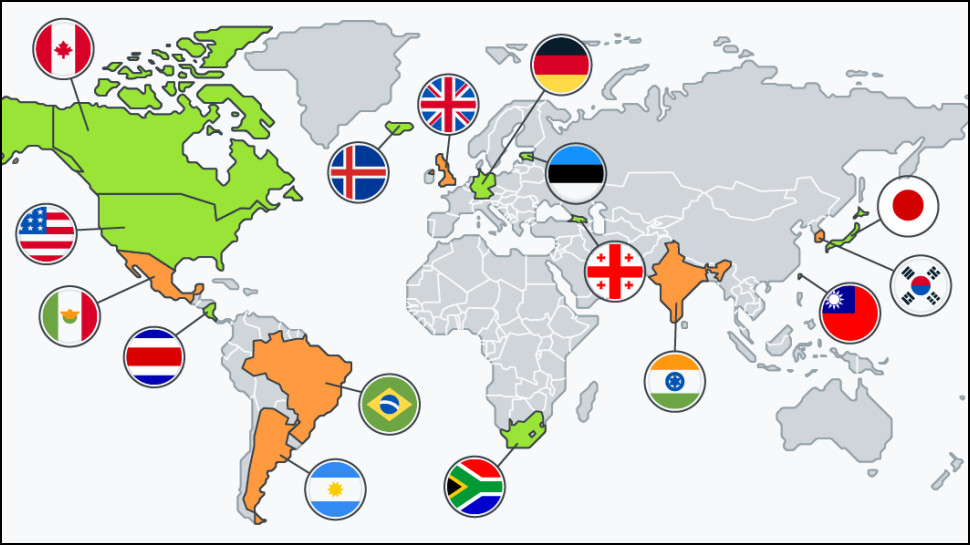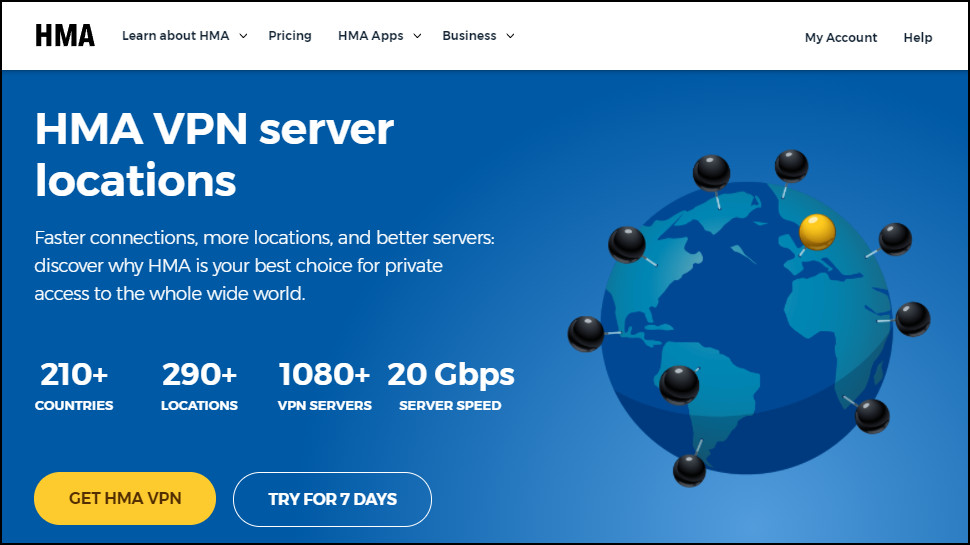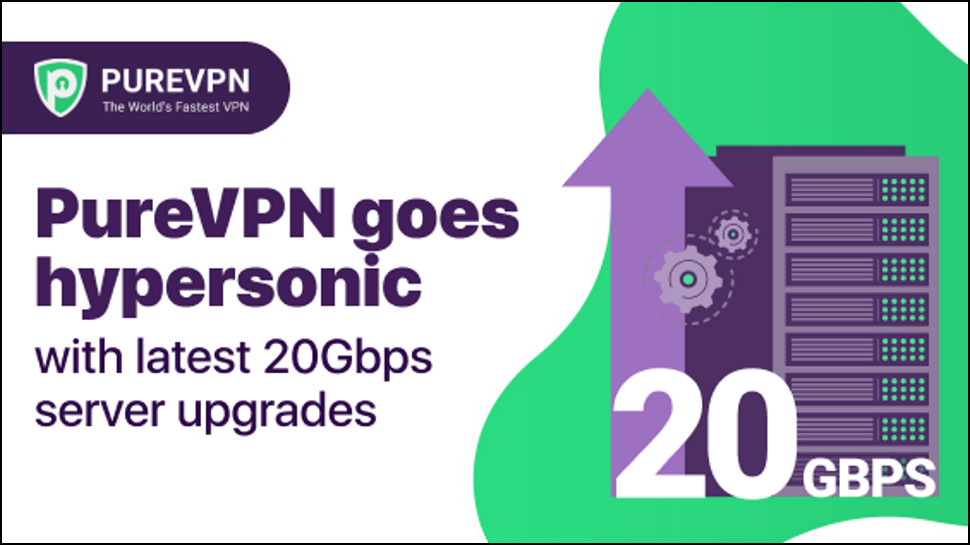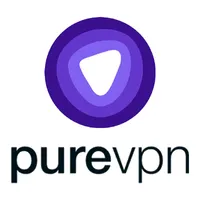Does VPN network size really matter?
Those big server totals are far less important than you might think

Sign up for breaking news, reviews, opinion, top tech deals, and more.
You are now subscribed
Your newsletter sign-up was successful

1. Virtual servers
2. Do you really need so many locations?
3. VPN server speeds
4. Quality - not quantity
If you're checking out any of the best VPNs and you want a quick way to judge how good it really is, there's one particular boast that providers have traditionally displayed to stick out from the crowd.
"We've got thousands of VPN servers", they declare proudly. And established in hundreds of locations, across a record-breaking number of cities all around the world, no less.
This focus on network size seems to make sense. More locations suggests there's a better chance you'll have one close to you, improving performance. And 1,000 servers has to be better than 100, as it spreads user load, and you're less likely to see speeds nosedive at peak times.
While that may be true, the reality is often more complex. Here we'll look at why network size might not matter as much as you think, and how VPN providers are beginning to move to new ways of improving their service.
- Looking for a bargain? Here are today's best VPN deals
Virtual servers
If you're looking for a VPN with servers everywhere, then HideMyAss! (or HMA as it's now more commonly known) is the provider to check first. It's 'the biggest VPN network in the world', says the website, proudly. And with 290+ locations spread across 210+ countries, it just might have a point. Even a giant like ExpressVPN has servers in 'only' 94 countries, while NordVPN trails behind with 59.
Look at the HMA website, though, and it explains that some of these are 'virtual servers.' The company says, "they are physically located outside the country they claim to be in, but use that country’s IP address so it appears as if you’re connecting through that region in question."
HMA doesn't use virtual servers much in North America or Europe, but it's very different in the rest of the world. The company has an impressive 50+ countries in Africa, for instance, way ahead of the competition (NordVPN has a total of five in Africa, the Middle East and India put together). But almost all of these are virtual servers. They'll give you an IP address from Nigeria, Bahrain, Fiji or wherever you are, but the servers aren't located in those countries and won't give you the performance boost you might expect.

Just to be clear, HMA isn't doing anything wrong here. Quite the opposite: it's totally up-front on the website, tells you where it's using virtual servers, how many and exactly what they are. Other providers might hide this detail away in the support pages somewhere, or never mention it at all.
What this does mean, though, is you can't assume that choosing a VPN with 250 countries, rather than 25, will necessarily mean you'll be allocated a server physically closer to you. You might get an IP address from China, for instance, but the server could be anywhere.
VPN variety
So what? You may ask. Surely if the server appears to be in a far off country but is actually closer to you, won’t that make for a faster connection? What does it matter if there are only a few of them?
The short answer is yes: if a VPN server is closer to you, it’ll reduce latency i.e. the time it takes to send and receive data from your device. This will make for a faster connection
However, this works both ways : if you select a server which is supposedly in a country close to you in the hope of a speedier connection & it turns out that it’s actually much further away your connection will be slower.
If the server is physically located in a country which requires providers to log connection records, or is known not to tolerate hacking, your data could also be at risk.
When you use a VPN service, you’re trusting them with this sensitive data. When they in turn rent a virtual server to provide their VPN service, they have to trust the virtual server hosting provider with this information. As such, it’s much safer for everybody if your VPN service sets up & maintains its own physical servers.
The next best option is for your provider to use bare metal servers. These are still rented out from a third party but the client (in this case your VPN provider) doesn’t have to share the server with anyone else.
This is an easy way for your VPN Provider to expand their server network but there’s still a risk that this ‘bare metal’ server’s data could leak to the people who actually own it.
Make sure to research your provider thoroughly before subscribing to a VPN.
VPN servers, locations or countries?
Another complication with network stats is you can interpret them in several ways.
As mentioned above, HMA tramples all over the competition with 290+ locations in 210+ countries. If you're always travelling the world - or maybe you just want to use HMA as a streaming VPN to unblock local TV across all of Asia, say - that'll be a major plus. If you don't need all those countries, though, it could be a very different story.
NordVPN lags far behind HMA on the location front, for instance, but has many more servers - 5,000+ vs 1,000+. If all you're looking to do is connect to a server in the United States, there's no contest: HMA has around 275, but NordVPN has around 1800 spread across 15 different cities.
Even these stats don't tell you the whole story, unfortunately. There's another major factor you need to consider.
VPN server speeds
The real problem with VPN network figures is that all servers are not the same.
One provider's server might be a cheap VPS (virtual private server( from a budget web host, sharing a 1Gbps web connection with 25 other websites.
Another could be a powerful dedicated server, with a 20GBps connection all to itself.
Even if there's a big difference in two provider's server numbers - 100 over here, 1,000 over there - it's difficult to properly compare the networks unless you've some idea of the technology they use.
There's good news, though. VPN providers are finally beginning to realize that the 'I've got more servers than you' wars aren't working any more. It's not about quantity these days, as much as network quality.
Nord VPN, for instance, has a built-in tool on its website to calculate which would be the fastest server for you based on your location. You can choose servers from other countries but also ones for particular purposes such as streaming video. You can also choose between different VPN protocols, which can affect your connection security and its speed.

Server hacking
If you’re satisfied with your connection speed, you may also wonder if having more servers is safer. If, after all, your VPN provider has 5,000 servers doesn’t that make your traffic much harder to detect?
VPN’s do sometimes get hacked. One of NordVPN’s servers was briefly compromised in 2018 for instance. The company quickly fixed the problem and pointed out that the issue only affected one of the many thousands of machines they operate.
This particular one in Finland didn’t contain user data and the most an attacker could have done in that case would have been to monitor server traffic. As most sensitive data like passwords is protected by SSL/TLS, the impact was minor.
Still, this probably wouldn’t be much comfort if you’d happened to use the particular server that had been hacked. Surely then, the more servers there are the less likely you’d be to pick the particularly unlucky one?
This kind of reasoning doesn’t take into account the realities of server maintenance however. NordVPN were renting this server from a third-party data centre. They were quick to point out their own servers were perfectly safe, as they maintained best practices.
Problems like these can occur when a network provider is simply spread too thin. Every new server added is one more than needs to be secured. On the other hand, if you’re operating fewer servers it’s easier to maintain each of them.
Quality - not quantity
PureVPN had spent years building up some very impressive network numbers, but 2021 saw that change, and in a big way. The company has ditched many of its old virtual servers, cutting the network from 180+ locations in 140+ countries, to 86 locations in 78 countries.
In previous years that might have looked like bad news, but PureVPN explained why it was actually a plus: '...we shelved dozens of virtual servers... to offer a top-notch VPN experience... Our physical VPN servers are more reliable and better equipped to deliver faster speeds...'
The company is now focusing on those physical VPN servers, instead, by upgrading them to speedy 20Gbps connections.
PureVPN isn't alone in moving the focus from raw server numbers to what its hardware can actually do. IPVanish has been telling the world all about its network upgrades for a long time, including a move to 25Gbps connectivity.
This isn't just about speed. Providers are coming up with their own ways to ensure their network stands out from the crowd. ExpressVPN's TrustedServer technology sees servers run entirely in RAM to improve their security, while NordVPN now wholly owns and manages some servers through a colocation scheme.
The need for speed
Although, as we said, not everything is about speed, NordVPN also offer its very own tool to test your VPN’s.
This, perhaps, is a recognition of their 2020 survey where they asked users which features are most important in a VPN. Over 97% of them felt connection speed was at least “important”, which is why selecting a reliable VPN server is so important.
Providing a reliable benchmark for testing is difficult but NordVPN’s supports a number of providers such as a PureVPN and ExpressVPN besides their own.
It takes into account factors like different results from testing over Wi-Fi versus Ethernet, as well as the fact that some web browsers perform at different speeds.
Naturally the more VPN servers a provider has, the more difficult it is to reliably test their connection speed but if this is an issue for you, remember that the number of servers and their location aren’t the only factors that make for a fast connection.
If your current provider doesn’t offer enough speed after testing, take some time to read our guide to the fastest VPNs.
Servers in summary
This is the beginning of a change, not the end. Plenty of providers still only talk about server totals, and give customers precisely no idea if these are physical or virtual, what protocols they use and so on.
But the direction of travel is clear. In future, we're going to hear far less 'my network is bigger than your network', and far more detail on why a VPN's servers stand out, and exactly what they can do.
- PC user? These are the best Windows 10 VPNs
- Or for those that prefer Apple, these are the best Mac VPNs
Sign up to the TechRadar Pro newsletter to get all the top news, opinion, features and guidance your business needs to succeed!

Mike is a lead security reviewer at Future, where he stress-tests VPNs, antivirus and more to find out which services are sure to keep you safe, and which are best avoided. Mike began his career as a lead software developer in the engineering world, where his creations were used by big-name companies from Rolls Royce to British Nuclear Fuels and British Aerospace. The early PC viruses caught Mike's attention, and he developed an interest in analyzing malware, and learning the low-level technical details of how Windows and network security work under the hood.
